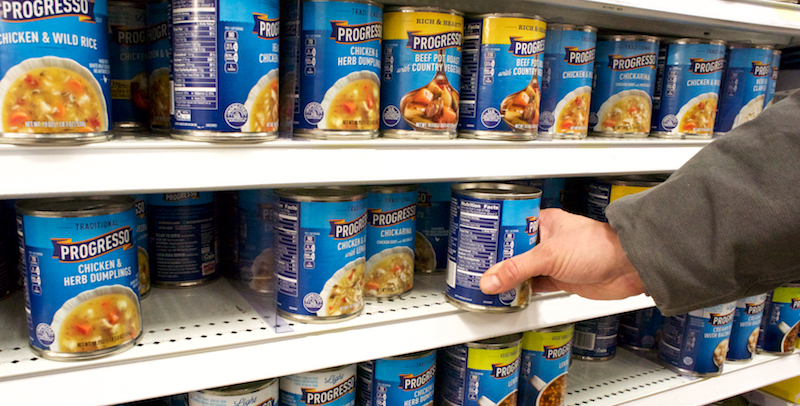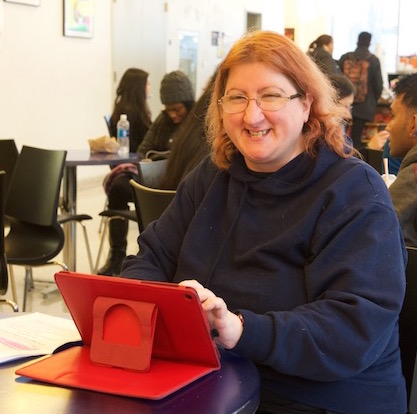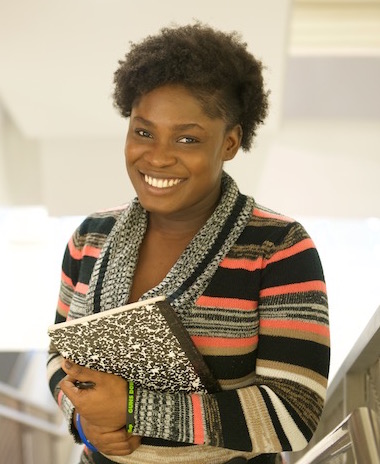
“As we design for success, we must design for a culture of care,” said Karrin E. Wilks, Borough of Manhattan Community College (BMCC/CUNY) Provost and Senior Vice President of Academic Affairs, in her address at the 2018 Faculty Convocation in January. “At BMCC, we have worked over time to create a culture of care by taking responsibility for the whole student, for all the factors that affect student success.”
Reaching out to the “whole student” is part of the mission of the BMCC Office of Student Affairs. “We help students to develop skills and interests through co-curricular activities. We also assist students who face obstacles that can impact their success,” says Marva Craig, Vice President for Student Affairs. “In addition to services we provide through the Counseling Center, the Women’s Resource Center, the Veteran’s Resource Center and the Office of Accessibility, Student Affairs has been expanding the College’s culture of care with programs to support foster care students, first-generation college students, DREAMERS and expecting parents.”
In addition to these services, Student Affairs has addressed the issue of food insecurity for many years, providing students in need with meal vouchers and gift cards to local food stores made possible through the generosity of the BMCC Foundation and BMCC Hardship fund. The Office of Student Affairs connects students with wraparound services through the Single Stop Office, Craig says, because “To do their best, our students must have reliable access to affordable, nutritious food and other support services.”
The urgency of these services is underlined by the fact that 71 percent of BMCC students come from families earning less than $30,000 a year, many below the poverty line. In a recent Association of Community College Trustees (ACCT) survey of 33,000 community college students nationwide, 56 percent reported food insecurity, “and I think we can safely say that these rates are underreported,” Wilks said.
A wrenching choice
“Imagine having to choose between groceries and paying your rent,” says Deborah Harte, Student Life Manager for BMCC Single Stop. “When a family is living check to check, it doesn’t take a lot to tip the balance and force them into very difficult decisions, like whether to go hungry or keep a roof over their heads.”
Harte says food insecurity is often linked to barriers such as housing and immigration status. The Single Stop staff specialize in addressing food insecurity by presenting options such as access to the Supplemental Nutrition Assistance Program (SNAP), and providing gift cards and vouchers to local grocery stores.
Also, for an immediate stop-gap to the threat of hunger, a Single Stop food pantry is being constructed at BMCC and will offer canned and dry food that follows the MyPlate balanced meal model—two proteins, two fruits, three vegetables, two grains and one dairy item—suggested by the United States Department of Agriculture (USDA).
“Although many of the foods we will have on hand are canned or boxed, they are considered nutritious,” Harte says. “Additionally, because of space restrictions, having fresh or frozen food is oftentimes very challenging.”
Encouraging students to come forward and take advantage of these resources when they are experiencing food insecurity is part of the challenge of serving them, says Harte. “We are always looking at new ways to reach out to those students. The more open we are, as a community, about the prevalence of hunger as a condition our students face, the more we can connect them to our services.”
The complicated process of seeking help

When Liberal Arts major Bernadette Perna learned about the food assistance program at BMCC Single Stop, “I was uncomfortable asking for help, so it took another three years for me to go there and check it out,” she says.
Perna, who has just switched her major to Liberal Arts, plans to transfer eventually to York College, CUNY, and earn a bachelor’s degree in Nursing. Her special area of interest is geriatrics, and to build her resume, she has volunteered at Calvary Hospital in the Bronx since Summer 2017.
“I’m a transporter,” says Perna, who has worked in the health field for 21 years as a home health aide, a hospice aide and Certified Nursing Assistant (CNA). “I transport patients from their room to the recreation center, and then back up. I love it. I try to encourage people; I talk to them about the calendar of activities that might be right for them.”
When it became a struggle to come up with grocery money for herself, Perna says, she first tried to solve the problem by approaching agencies on her own.
“I had been going to the Food Stamps office, but they were denying services to me because they needed documents I didn’t have access to,” she says.
She also sought support through churches near her home in Queens, “but they kept giving me canned food; no vegetables or meat or dairy,” says Perna, who is committed to her fitness and eating a healthier diet.
Eventually, she made her way to the BMCC Single Stop office, and was referred to food donation sources near her home, “but they also had just cans of food,” she says.
On her next visit to Single Stop, she was given a food voucher to use right away in the BMCC cafeteria. She also sat down with a Single Stop staff person who specializes in assisting individuals with their application to receive Food Stamps.
“She helped me write a statement about how much I’m making and other information, and they gave me a phone interview and sent a letter saying how much I would receive a month,” Perna says. “It was very fast, within a week.”
The link between loss of housing and food insecurity
Community Health major Monique Flanders, like Bernadette Perna, is committed to better nutrition and is determined to reach a healthier weight—goals that became hard to maintain when she and her husband were evicted from their apartment in August 2017.
“We couldn’t find another place and were bouncing around from hotel to hotel,” says Flanders. “Somehow with my husband’s two full-time jobs and my credit cards, we found temporary places but in the process, we incurred so much debt.”
She points out that with no kitchen, and only a mini-refrigerator in the rooms where they stayed, good nutrition was virtually impossible. In addition, her 20-year-old daughter—a college student—joined them at this time, and the expense of three people eating out meant skipping meals.
Once she sat down with a counselor at the BMCC Single Stop office, “They gave me gift cards to a supermarket,” she says. “I went there right away and got yogurts, salad, boiled eggs—protein; things that were cooked—and took them home to the mini-refrigerator in the hotel.”
After a few days of better food, “I had more energy for class,” she says. “When all you’re eating is fast food or carbs, you feel groggy. You feel lethargic.”
Throughout Fall 2017, Flanders maintained her grades—“one A, a B+ and two Bs,” she says with pride. In December 2017, the family entered the City of New York Homeless Shelter system, and are now living in a shelter in Brooklyn while they line up their finances for more permanent housing.
Six siblings stick together

The link between homelessness—or the threat of homelessness—and food insecurity is all too well understood by Public Health major Shernidane Romelus.
Having grown up in Haiti, Romelus was 14 years old when the earthquake of 2010 devastated the island, taking the lives of more than 230,000 people. That tragedy and the cholera epidemic that raged in the quake’s aftermath made a powerful impact on the teenager, who wants to build a career in nonprofits, she says, assisting people in need.
In 2014, Romelus moved to New York City and earned a High School Equivalency diploma at Linden Learning Center in Brooklyn. While attending the center, she completed an internship with the nonprofit Flanbwayan Haitian Literacy Project, and they hired her to join their Leadership Team as an Outreach Coordinator.
Next, she enrolled at BMCC and joined ASAP—a small cohort program that provides mentoring, career counseling and other services—and moved into a one-and-a-half bedroom apartment in Brooklyn, along with her five siblings.
“The boys have the small room and the girls have the big room,” she says. “My little brother, the youngest one, is still in high school but the rest of us are in college and working. I help him with his essays but he doesn’t need help with math and science. My oldest sister is his guardian and together we go to his meetings at school.”
This tight-knit group of ambitious young people faced a serious challenge in Fall 2017 when their rent went up 30 percent and one of the siblings lost her job.
“We were all putting money toward the rent, but there wasn’t any left for food,” Romelus says. “ASAP covered my Metro Card, and that was a very big help, but it wasn’t enough.”
Throughout this difficult time, she kept up her grades and as part of the structure of ASAP, met monthly with a dedicated counselor. “I asked if she knew of another college outside New York City that I could transfer to, where it would be easier to find housing and stay fed,” Romelus says, “and she looked at me and said, ‘What’s going on with you?’”
At that point, Romelus told her the truth.
“Right away, she brought me to Single Stop for services and that’s when I found out they would not only help me with food, but they could help with housing. They gave me a Food Market card that I used in a grocery store and I gave it to my sister who does groceries for the house.”
“If I can do it, so can you.”
Looking ahead, all three students—Bernadette Perna, Monique Flanders and Shernidane Romelus—see a brighter future than they once imagined.
Romelus wants to transfer to Brooklyn College when she graduates from BMCC. Flanders plans to either graduate in Summer 2018 or apply to take part in the BMCC Study Abroad program. “One of my professors has been promoting it and I’m really interested in the project they do in Argentina. It’s now or never,” she says.
Perna says of her time at BMCC, “This is the first semester that I’m actually very happy about, and I’m having a positive attitude. I can go forward toward my degree now. I know if I need any more help, I can go back to Single Stop, and they can help me with whatever I need.”
She reiterates that students should take advantage of the resources available to them.
“If you go to BMCC and you’re lost, there’s always a place you can go, to get some help,” she says. “It’s called Single Stop. I’ve been through it and they helped me. If I can do it, so can you.”
STORY HIGHLIGHTS
- In a survey of 33,000 community college students, 56 percent reported food insecurity, or not having access to a reliable source of nutritional, affordable food
- BMCC Office of Student Affairs and Single Stop provide cafeteria food vouchers and supermarket food gift cards, as well as assistance in processing Supplemental Nutrition Assistance Program (SNAP) applications
- There is a strong link between homelessness and food insecurity

